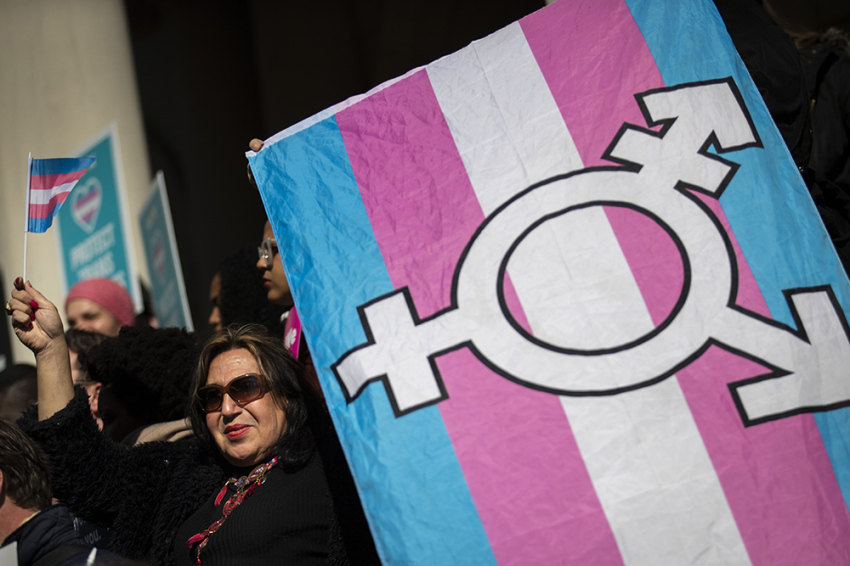Pediatricians group says evidence lacks to support gender sugeries, hormones for trans youth

The American College of Pediatricians has released a new position paper outlining findings based on a review of dozens of studies to claim that providing gender transition procedures to minors with gender dysphoria does not lead to an improvement in mental health.
The ACP, which describes itself as a 600-member “national organization of pediatricians and other healthcare professionals dedicated to the health and well-being of children,” released the report Monday titled “Mental Health in Adolescents with Incongruence of Gender Identity and Biological Sex.”
The group has long expressed skepticism about surgical and hormonal interventions for children who say they identify as the opposite sex and warns that trans-identified children are “at higher risk for psychopathology than their peers” even in cases where they receive some type of gender transition procedure.
In an interview with The Christian Post, the report’s author, ACP board member Dr. Jane Anderson, said, “The most important thing is to recognize that these adolescents need and benefit from mental health support.”
“There is a high incidence of adolescents who come into this medical care who have previous history of depression or anxiety or autism or other medical or psychological concerns,” she said.
“And those issues have to be dealt with first,” she added. “It’s just crucial that they receive the mental health services and support that they so desperately need.”
The paper expressed concern that “parents, along with health care and educational professionals, who support the transgender ‘transition’ of children and adolescents are, in fact, contributing to increased depression by appearing to validate to the children that ‘something is wrong with their body and biological sex.’”
The document cites multiple studies to back up its assertions.
The Adolescent Brain Cognitive Development Study, which examined 7,111 cisgender children and 58 trans-identified children between the ages of 9 and 10 in 2022, found that trans-identified youth in this age group were 2.53 times more likely to experience depression than their peers who did not suffer from gender dysphoria, the report states.
Trans-identified children in the study were also 2.7 times more likely to experience anxiety, 3.13 times more likely to have conduct problems and 5.79 times more likely to possess suicidal thoughts, Anderson added.
The Healthy Minds Study, which surveyed 65,213 students at 71 college campuses across the United States between 2015 and 2017, revealed that 78% of students classified as “gender minorities” showed signs of depression, anxiety, eating disorders, self-injury and suicidality compared to only 45% of respondents who were not “gender minorities.”
Psychological evaluations of 49 youth seeking gender transition procedures in Vienna, Austria, found that 57% of them had at least one psychiatric diagnosis.
The report states that in another study evaluating 919,868 children between the ages of 9 and 18, 8.6% of participants who had an autism spectrum disorder experienced gender dysphoria compared to 0.6% of those not on the autism spectrum.
Additionally, Anderson reported the rate of suicide attempts among trans-identified youth “is not different from that experienced by individuals who have experienced bullying or who identify as LGB.” Anderson described this finding as “a little surprising because we’re told over and over again it’s so important that you allow your adolescent to transition or they are going to kill themselves” due to a reportedly higher suicide among trans-identified youth compared to their cisgender peers.
Additional data included in the report attempted to determine whether there was a relationship between “adverse childhood events” and “transgender identity.”
Anderson cited a study of 3,508 LGBT adolescents that found respondents reported an average of 3.14 “adverse childhood events” such as “exposure to domestic violence, mental illness, alcohol or drug use in the home, physical or emotional abuse or neglect, sexual abuse, and parental divorce.”
A survey of 1,665 parents of children with gender dysphoria showed that 57% of trans-identified adolescents had mental health concerns dating back to an average of 3.8 years before they began to experience discomfort with their biological sex and 42.5% of them had received a “formal psychological diagnosis.”
Anderson wrote that a study from the McMaster University Department of Health Research Methods found that it is “unknown whether people with gender dysphoria who use puberty blockers experience more improvement in gender dysphoria, depression, anxiety, and quality of life than those with gender dysphoria who do not use them. There is very low certainty about the effects of puberty blockers on suicidal ideation.”
“A 2021 comprehensive data review of all 3,754 trans-identified adolescents in US military families over 8.5 years showed that cross-sex hormone treatment leads to increased use of [mental] health services and psychiatric medications, and increased suicidal ideation/attempted suicide,” the report stated.
The 2021 study indicated that “when transgender-identifying adolescents who were using gender-affirming pharmaceuticals (963) were evaluated separately, their use of mental health care services did not change but their use of psychotropic medications did increase,” Anderson wrote.
“There is strong evidence that children and adolescents who identify as transgender have experienced significant psychological trauma leading to their gender dysphoria,” Anderson concluded.
She also asserts that “there is no long-term evidence that current ‘gender affirming’ medication and surgical protocols benefit their mental well-being.”
“High rates of suicide attempts and/or completions in those who have received ‘gender affirming’ interventions indicate that at minimum, long term controlled trials should be conducted if these interventions are to be continued. More attention and support should be afforded to individuals seeking help in detransitioning after having made a decision during their formative adolescent years with life-long consequences, including possible sterility and loss of sexual function.”
After reiterating its opposition to allowing trans-identified youth to obtain gender transition procedures, the ACP recommended: “intensive psychotherapy for the individual and family to determine and hopefully treat the underlying etiology of their gender incongruence.”
Anderson’s report comes as other professional organizations have voiced their approval for surgical and hormonal interventions.
The American Medical Association contends that "improving access to gender-affirming care is an important means of improving health outcomes for the transgender population."
“Receipt of gender-affirming care has been linked to dramatically reduced rates of suicide attempts, decreased rates of depression and anxiety, decreased substance use, improved HIV medication adherence and reduced rates of harmful self-prescribed hormone use,” the AMA states on its website.
In 2022, the American Academy of Pediatrics stated that it doesn’t recommend body mutilating surgeries to most youth after it was accused of ignoring findings that led European countries like Sweden, Finland and the United Kingdom to place severe restrictions on medical transition for minors.
In the U.K., for instance, England’s National Health Service announced last June that it would only commission puberty-suppressing hormones as part of clinical research, restricting use of puberty-blocking drugs for gender transition outside of clinical trials.
While Anderson’s paper did not elaborate on the long-term impacts of gender transition procedures, the ACP previously warned of the side effects of the life-altering treatments. Specifically, the group listed “osteoporosis, mood disorders, seizures, [and] cognitive impairment” as possible long-term impacts of puberty blockers while cautioning that “cross-sex hormones put youth at an increased risk of heart attacks, stroke, diabetes, blood clots and cancers across their lifespan.”
Anderson raised additional concerns about the impact of gender transition procedures on adolescents in light of the fact that their brains are still developing and they are not mature enough to make major life-altering decisions.
“I think it is unacceptable to allow adolescents who are not allowed to get a tattoo in some states, who aren’t allowed to take a Tylenol at school without parental consent to be allowed to make such lifelong decisions that are going to affect their fertility, often … end up sterilizing them.”
Concerns about the long-term impacts and effectiveness of gender transition procedures have prompted 23 states to ban minors from obtaining some or all of them: Alabama, Arizona, Arkansas, Florida, Georgia, Idaho, Indiana, Iowa, Kentucky, Louisiana, Mississippi, Missouri, Montana, Nebraska, North Carolina, North Dakota, Ohio, Oklahoma, South Dakota, Tennessee, Texas, Utah and West Virginia.
While crackdowns on gender transition procedures for minors are taking place at the state level, Anderson says they are still “being pushed in America.”
She hopes the U.S. would follow the lead of other countries who have been “investigating and actually looking at the research,” finding that “there are no benefits” to letting minors obtain gender transition procedures and “take a pause” on promoting the life-altering treatments.
Ryan Foley is a reporter for The Christian Post. He can be reached at: ryan.foley@christianpost.com



























